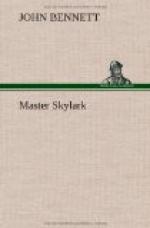“To Stratford—to-morrow?” stammered Nick, with a glad, incredulous cry, while his heart leaped up within him.
“Ay, verily; upon my faith as the fine fag-end of a very proper gentleman—thou shalt go back to Stratford town to-morrow if thou wilt but do thy turn with us to-night.”
Nick caught the master-player’s arm as they rode along, almost crying for very joy: “Oh, that I will, sir—and do my very best. And, oh, Master Carew, I ha’ thought so ill o’ thee! Forgive me, sir; I did na know thee well.”
Carew winced. Hastily throwing the rein to Nick, he left him to master his own array.
As for Nick, as happy as a lark he learned his new lines as he rode along, Master Carew saying them over to him from the manuscript and over again until he made not a single mistake; and was at great pains to teach him the latest fashionable London way of pronouncing all the words, and of emphasizing his set phrases. “Nay, nay,” he would cry laughingly, “not that way, lad; but this: ’Good my lord, I bring a letter from the duke’—as if thou hadst indeed a letter, see, and not an empty fist. And when thou dost hand it to him, do it thus—and not as if thou wert about to stab him in the paunch with a cheese-knife!” And at the end he clapped him upon the back and said again and again that he loved him, that he was a dear, sweet figure of a lad, and that his voice among the rest of England’s singers, was like clear honey dropping into a pot of grease.
But it is a long ride from Towcester to St. Albans town in Herts, though the road runs through a pleasant, billowy land of oak-walled lanes, wide pastures, and quiet parks; and the steady jog, jog of the little roan began to rack Nick’s tired bones before the day was done.
Yet when they marched into the quaint old town to the blare of trumpets and the crash of the kettledrums, all the long line gaudy with the coat-armour of the Lord High Admiral beneath their flaunting banners, and the horses pricked up their ears and arched their necks and pranced along the crowded streets, Nick, stared at by all the good townsfolk, could not help feeling a thrill of pride that he was one of the great company of players, and sat up very straight and held his head up haughtily as Master Carew did, and bore himself with as lordly an air as he knew how.
* * * * *
But when morning came, and he danced blithely back from washing himself at the horse-trough, all ready to start for home, he found the little roan cross-bridled as before between the master-player’s gray and the bandy-legged fellow’s sorrel mare.
“What, there! cast him loose,” said he to the horse-boy who held the three. “I am not going on with the players—I’m to go back to Stratford.”
“Then ye go afoot,” coolly rejoined the other, grinning, “for the hoss goeth on wi’ the rest.”
“What is this, Master Carew?” cried Nick, indignantly, bursting into the tap-room, where the players were at ale. “They will na let me have the horse, sir. Am I to walk the whole way back to Stratford town?”




